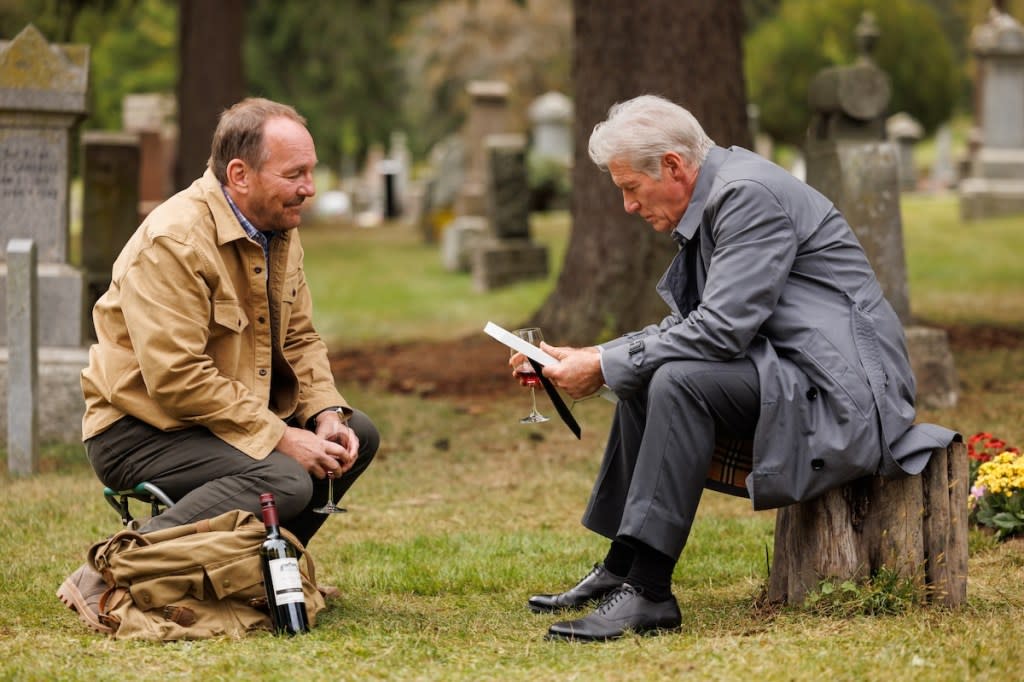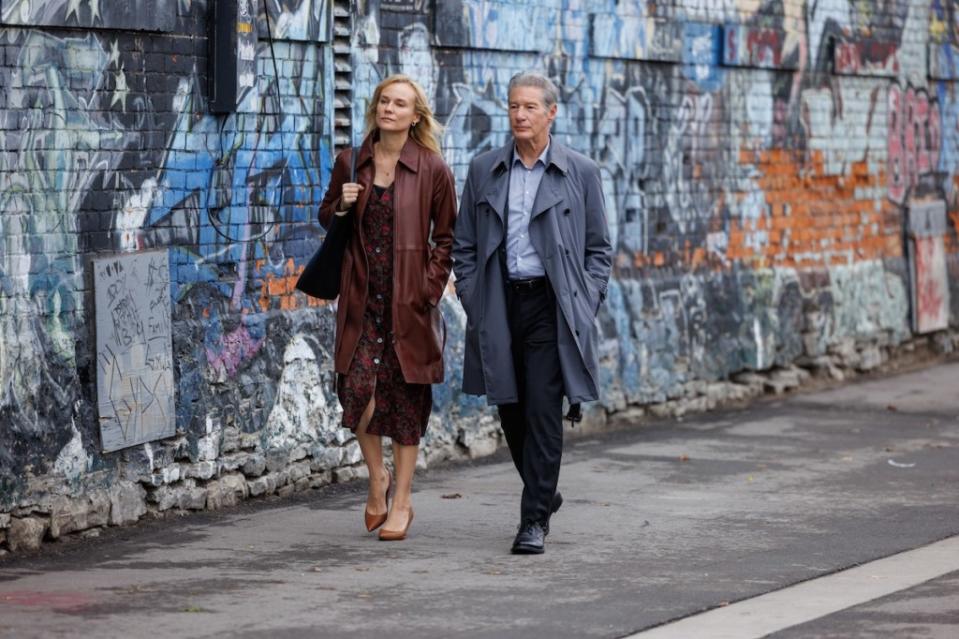Longing Director Savi Gabizon Talks Richard Gere Drama, Remaking His Own Movie

ComingSoon Editor-in-Chief Tyler Treese spoke with Longing director Savi Gabizon about the English remake of his 2017 Israeli film of the same name.
The new version of Longing stars Richard Gere and Diane Kruger in key roles and revolve around a father learning that he had a son that recently died. Gabizon discussed the unique situation of remaking his own movie in a different language and the film’s themes. Lionsgate Films will release Longing in theaters on June 7, 2024, and then comes on demand and digital on June 28.
“Golden Globe Award-winning actor Richard Gere and Diane Kruger star in this captivating drama and English remake of the celebrated film by the original director. Daniel Bloch (Gere) is shocked to discover a startling secret from his past and is immediately consumed by the extraordinary twists of a new life he never could have imagined,” says the synopsis. “With each new encounter, Daniel uncovers a deeper layer of this fascinating mystery until he arrives at a crossroad in his own life.”
Tyler Treese: You are remaking your own film, this time in English. What was the most unique experience about going back to this film that’s very near and dear to you and having a second chance to do it over? Were there many changes? I haven’t seen the original Israeli version.
Savi Gabizon: There were a few or maybe a lot of changes, but the huge changes in this version is something in the DNA, I think. I think the new one, the American one is a lot more exciting and succeeds to move you when you see it than the Israeli one. I think that Richard, with his weight, succeeds to take it to this direction, and that’s it. I think this is the main change — the direction of excitement. The small changes are cultural changes. If I need to summarize, what are the cultural changes from the Israeli culture to the American culture? I would define it as more subtle and less direct. The way of behaving and talking.
I was very moved by Longing. There’s this very interesting aspect where Richard’s character very much romanticizes the idea of his son at first because he never knew him in life. That definitely happens when you don’t actually know somebody, just the idea of them. What did you find most intriguing about really exploring that?
For me, it was very important that the character would experience his son’s failure, because I think that in those moments in life, when you, as a father, experience your son’s failure. In these moments, your fatherhood flourishes. So, I gave him some major points or some important points in his journey to recognize something bad about his boy and to decide how he’s going to react to this new fact that he gets right now. I think these are the interesting points in the journey, and it says something about fatherhood in general.
One of the aspects I found so interesting about Longing, and it’s kind of inherently ridiculous, is the idea of matchmaking of these two teens who very sadly passed away and setting up a wedding for the deceased. How did you come across that concept?
Actually it’s happened because my girlfriend came back from Singapore, and she told me she participate a wedding like this, a ghost wedding like this. That the Tao or maybe one part of the Tao, they had this [ghost] wedding that if a boy of them died, they tried to find a girl that also died, and they try to marry them [so] that in this world, that wherever they are, they will be together and love there. So I thought I would succeed [if I] build a story [around a] marriage like this [that] would be logical… If I could arrange circumstances that would allow marriage like this to happen in Western society and be logical, you would believe in this wedding. I thought it could be unique and interesting. So this was the beginning of the whole idea of the whole story, actually. This wedding was the root of the whole story.

One thing I really liked about Richard’s performance was that there’s a gentleness to him as the film goes on. Can you speak to working with Richard and what he gave to the character?
One thing I must tell you about this character. The first scene of him, he hears that he has a boy, and the first thing he does, he calls his lawyer. This is a very low step to begin with a character because it doesn’t help to love him, to identify with him. I needed a wonderful actor to succeed and to get up from this point. Richard is one of those actors who can do it because you love him. First of all, you love his eyes, you love his soul. You see his soul while he’s playing, while he’s acting. So you love him.
Richard, he loves acting and he loves actors. Sometimes, after he had done his role when we were shooting, he could go to his trailer, but he preferred to stay and give text to his partners because he loved being together with the actors and making the scene the best he could. So, I must tell you that to work with him, I felt blessed because he was really flexible and my partner all the way. He helped me to make this culture transition happen. We actually go scene after scene and try to think if this scene could happen in the United States in this way, or maybe we need to change it a bit. So he helped me a lot. He was my real partner in this film. Another one that helped me a lot in this culture transition was Oren Moverman, he is a very famous director in the US. So, for me, it was a wonderful and unique experience working with Richard.
I was curious about the title of Longing since you used it in both releases. We see Allen longing for his teacher, and we see Richard’s character really longing for a connection with his son. How did you kind of pick that title and what do you like about that title to kind of encapsulate the film?
I think that in a special way, there is energy of longing in the film. I felt it, and I chose this name because of this energy. I felt that although you cannot [have] longing [for] someone who you didn’t know, there is this kind of energy, and I decided that I want to call this journey Longing and let’s hope I was right.
One performance that really impressed me in the film was the young actress that plays Allen’s girlfriend, Jessica Clement. I particularly like the scene where she’s like, “How are you doing this wedding? I was his girlfriend.” How was it finding her and working with her?
First of all, she is 26 or now she’s 27 already or something like that. I made auditions, and I found her. She was terrific. You know, she has these big eyes, and she’s so wonderful and so pure inside, and you love her. I wanted her, but all the time I was afraid that maybe you see the age on her, you know? And she didn’t look like 16 … But I decided that the reason I love her so much should be the reason I would take her for the role. She did it wonderful. Really wonderful, and she looks 16, doesn’t she?
I had no clue she was as old as you just said she was.
I remember that in the shooting days. One time her father came and he looks like 20! It’s a family like this. It’s this kind of family.
I wanted to ask about the dream sequence with Alice, which is a centerpiece in both movies. She is sitting on the building. How was it filming that sequence with Diane Kruger?
First of all, when you do a sequence like this, the most important thing about it is not being erotic. It should be holy, not erotic. So the whole directing in this scene goes and works just for having [a] holy moment [that’s] not erotic, not at all. This is the beauty, I think, in this moment. Because the woman is naked and the boy is moaning, and so not being erotic in this kind of situation, it’s hard, but it’s possible. I think we succeeded. I think it’s a holy moment. It’s not an erotic moment, I think.
For the first time in my life, I used the intimacy coordinator. I think it’s wonderful. It’s wonderful because she helped me even more than she helped her. Sometimes, when you direct such a scene, you are really embarrassed as a man. You’re embarrassed even more so, and you are embarrassed to ask very specific things that you need. She even asked me if I want to ask, she was one step ahead, and all the time asked me if I want it like this or if I want it like this. It was really helpful. I recommend every director work with an intimacy coordinator because in Israel, we just begin with these coordinators to work with. It was really calm, nice, and easy to work.
I must tell you about Diane. I mean, the fact she’s beautiful, she is really beautiful. Its dominant exists. But the two things she brings is… One of the things is wisdom. You look at her, and you see a wisdom. And the other thing, which is even more important and rare, it’s a secret. Even when she smiles, you see a secret there. It gives the scene tension, and it gives the story tension. It’s really something really typical for her, and really rare and powerful, I think.
Thanks to Savi Gabizon for speaking with ComingSoon for our Longing interview.
The post Longing Director Savi Gabizon Talks Richard Gere Drama, Remaking His Own Movie appeared first on ComingSoon.net - Movie Trailers, TV & Streaming News, and More.
